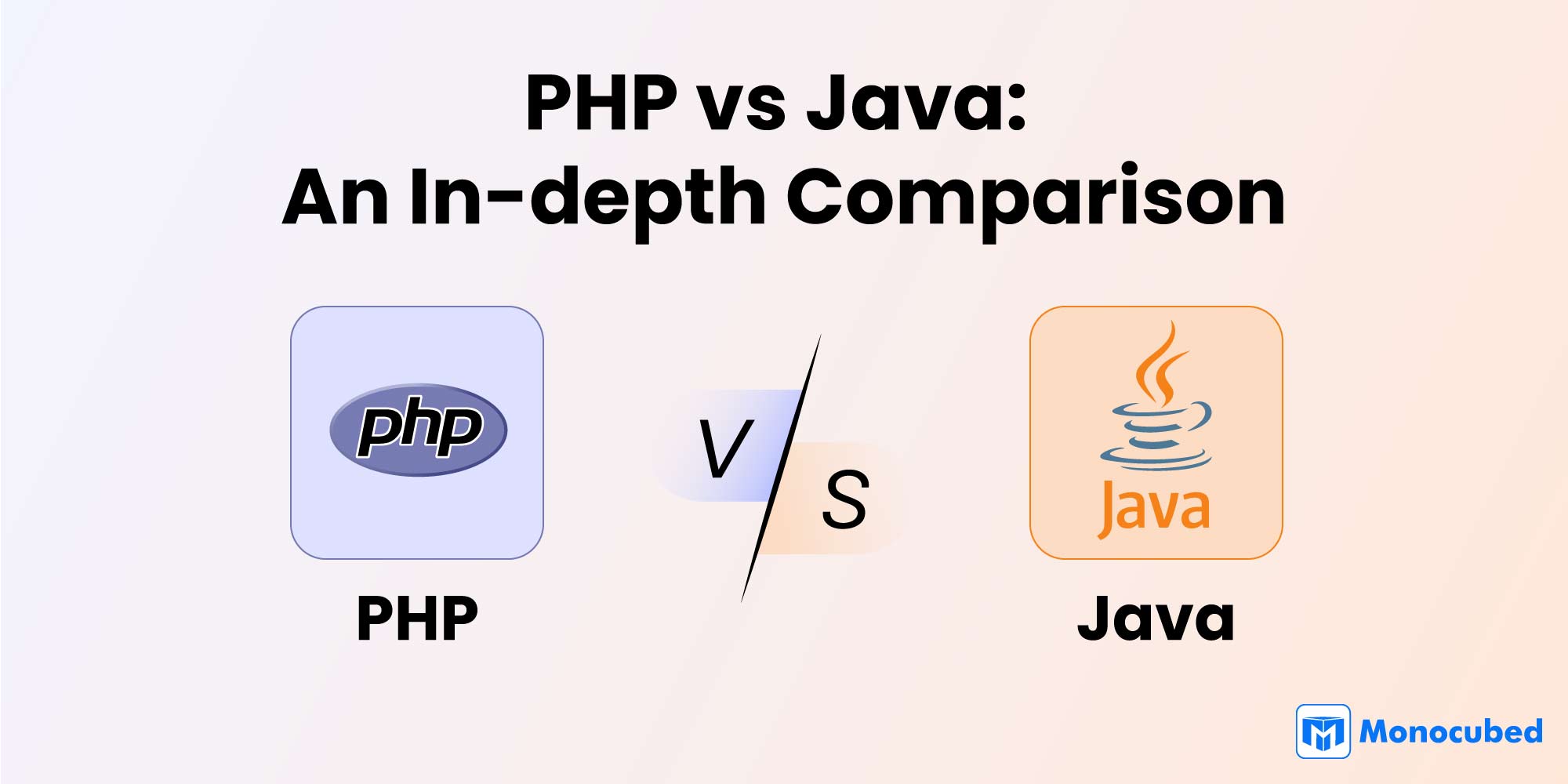When it comes to web development, choosing the best programming language is a crucial decision that can impact the success of your projects.
Two of the most prominent players in this arena are PHP and Java. Both programming languages have their strengths and weaknesses, and deciding which one to use depends on various factors, including your project requirements, team expertise, and performance expectations.
If you decide that PHP is the right fit for your project but need expert assistance, you can always consider hiring a PHP developer to ensure a smooth development process. On the other hand, if you lean towards Java for your web development needs, you may want to explore the option of hiring a Java developer to handle the intricacies of Java-based development.
In this article, you will learn about the PHP vs Java debate, and explore their key features, differences, and use cases to help you make an informed decision for your web development.
Table of Contents
PHP and Java: A Complete Understanding of Both Programming Languages
Before we delve into the detailed comparison of PHP and Java, it’s essential to have a clear understanding of these two programming languages. Let’s take a moment to introduce PHP and Java and explore their unique characteristics and areas of application.
PHP: The Server-Side Scripting Language
PHP, short for Hypertext Preprocessor, is a server-side scripting language tailored for web development. Its hallmark lies in its user-friendly nature, which makes it an attractive choice for developers ranging from beginners to seasoned experts. This programming language excels in creating dynamic web pages and integrates well into HTML code.
Benefits of PHP for Web Development
- Designed for web development.
- Simplicity and ease of use are its defining characteristics.
- Ideal for both beginners and experienced developers.
- Frequently utilized for generating dynamic web content.
- Seamless integration within HTML code for enhanced web functionality.
To enhance your PHP web development experience, you can take advantage of various PHP development tools. These tools can streamline your development process and boost productivity.
Java: The Versatile Programming Language
On the other hand, Java is a high-level, object-oriented programming language renowned for its adaptability and versatility. Its scope extends beyond web development, encompassing domains such as mobile app development (notably Android), desktop applications, and enterprise-level software solutions.
Benefits of Java for Web Development
- A versatile programming language used across various domains.
- Known for its high-level and object-oriented programming approach.
- Famed for portability, thanks to the Java Virtual Machine (JVM).
- Widely utilized in mobile app development, including Android applications.
- Suitable for building robust desktop applications.
- A preferred choice for creating enterprise-level software solutions.
Just like PHP offers a range of benefits for web development, Java provides its own unique advantages, making it a valuable choice for a wide array of development projects and applications.
PHP vs Java: In-depth Head-to-Head Comparison
Now, let’s dive into a detailed comparison between PHP and Java in various aspects, from performance to ease of use and community support. This comprehensive analysis provides valuable insights to help you decide which programming language aligns best with your web development needs.
By examining these key factors, you can make an informed choice that will ultimately impact the success of your web projects.
-
Performance Analysis: PHP vs Java in Speed and Scalability
Performance plays a crucial role in web development because it impacts how fast and smoothly websites or applications run, directly affecting how users experience them.
Here is a comparison based on the performance:
Aspect PHP Java Speed PHP is an interpreted programming language, which can be slower than Java. However, PHP 7 and later versions have significantly improved its performance. Java is compiled into bytecode and runs on the Java Virtual Machine (JVM), resulting in faster execution speed. Scalability PHP can handle small to medium-sized web apps efficiently. For larger, complex projects, performance may become a concern. Java is known for its scalability and is suitable for handling complex projects and enterprise-level apps with high traffic. Winner: Java
Java’s compiled nature and JVM execution provide better performance for complex projects, ensuring seamless user experiences even in high-traffic enterprise-level applications.
-
Ease of Use: PHP’s Simplicity vs Java’s Learning Curve
Ease of use is important, especially for developers new to programming or aiming for quick and straightforward development.
Here is a comparison of the ease of use between PHP and Java:
Aspect PHP Java Syntax PHP has a simple and intuitive syntax, making it easy for beginners to grasp. Java’s syntax is more verbose and can be challenging for newcomers. Learning Curve PHP has a shorter learning curve, and developers can quickly start developing web applications. Java requires a steeper learning curve, especially for those new to programming. Development Speed PHP allows for faster development with its concise code and built-in web development features. Development of Java may be slower due to its stricter coding standards and the need for more verbose code. Winner: PHP
PHP’s ease of use, shorter learning curve, and faster development speed make it a more user-friendly choice for many web developers.
-
Community Support and Libraries: The Backbone of Web Development
Community support and the availability of libraries and frameworks are essential for making development more efficient.
Here is a comparison of PHP and Java for community support and libraries:
Aspect PHP Java Community Size PHP has a large and active developer community, resulting in numerous resources and support forums. Java boasts one of the largest developer communities, offering extensive support and various libraries and frameworks. Libraries/Frameworks PHP has popular frameworks like Laravel and Symfony, along with multiple libraries for different purposes. Java has a plethora of libraries and frameworks, including Spring, Hibernate, and Apache Struts, making it suitable for diverse project requirements. Winner: Java
Java’s extensive community and a vast ecosystem of libraries and frameworks provide unparalleled support and resources for developers.
-
Security Features: Safeguarding Your Web Applications
Security is extremely important in web development because any breaches or vulnerabilities can lead to problems and harm the safety of your data and users.
Here is a comparison of security features:
Aspect PHP Java Built-in Security PHP offers built-in features, such as input validation functions and security libraries. Java’s strict type system and robust security features make it inherently more secure. Vulnerabilities PHP applications are more susceptible to common web vulnerabilities like SQL injection and cross-site scripting (XSS). Java applications are generally less vulnerable to web threats due to their strong typing and security features. Winner: Java
Java’s strict typing, robust security features, and outstanding performance make it a more secure and efficient choice for web application development.
-
Memory Consumption: Making Every Byte Count
Memory usage is essential in web development because it influences how well web applications can grow and how efficiently they can run, which affects their overall cost-effectiveness.
Here is a comparison of PHP and Java for memory usage:
Aspect PHP Java Memory Consumption PHP consumes less memory, making it suitable for smaller projects and shared hosting environments. Java typically requires more memory due to the JVM overhead, making it better suited for dedicated servers. Winner: PHP
PHP’s lower memory consumption makes it a cost-effective and efficient choice for smaller projects and shared hosting environments.
-
Use Cases: Matching the Right Tool to the Right Job
To make an informed decision, it’s crucial to consider the specific use cases where PHP and Java excel:
PHP Use Cases:
- PHP is well-suited for developing small to medium-sized web applications and websites.
- It is commonly used for creating dynamic web pages and content management systems (CMS) like WordPress and Drupal.
- PHP is a popular choice for building e-commerce websites and online forms.
- It is ideal for rapid prototyping and quick development of web-based projects.
- Java is preferred for large-scale, enterprise-level applications with high traffic and complex requirements.
- It is commonly used in web development services and server-side applications.
- Java is the programming language for Android app development, making it essential for mobile app developers.
- It is used in building complex systems such as banking software, airline reservation systems, and data centers.
-
Cost Considerations: Balancing Your Budget
Cost is an important consideration when selecting a high-level programming language for web development, as it influences the overall budget and expenses associated with a project. When considering the cost of web development, it’s crucial to explore various factors, including the choice of a PHP development company or Java development services.
Here is a comparison of the cost considerations:
Aspect PHP Java Development Cost PHP development is generally more cost-effective due to its shorter development time and lower learning curve. Java development may require a higher initial investment for developer salaries and project duration. Hosting Costs PHP hosting is often more affordable, as it can run on shared hosting plans. Java hosting can be costlier, as it typically requires dedicated server resources. Licensing PHP is an open-source programming language and is free to use, making it a cost-effective choice. Java is an open-source programming language, but certain enterprise-level features may require licensing from Oracle. Winner: PHP
PHP’s lower development cost, efficient development process, and affordable hosting options make it a cost-effective choice for many projects.
Java Use Cases:
FAQs about PHP vs Java
-
Can both Java and PHP be used in the same project?
Yes, you can use both programming languages, PHP and Java in a single project, which is called “polyglot programming.”
It’s useful when different parts of the project are better suited to one programming language over another. You can make them work together through APIs, microservices, or web services like RESTful APIs. However, managing multiple programming languages in one project can be complex and requires coordination.
-
What are some popular frameworks for PHP and Java?
Here are some popular frameworks for PHP and Java.
Popular PHP Frameworks:
- Laravel: Known for its simplicity and developer-friendly features.
- Symfony: Offers reusable components and a strong foundation.
- CodeIgniter: Lightweight and ideal for fast development.
Popular Java Frameworks:
- Spring: Comprehensive, suitable for enterprise-level apps.
- Hibernate: Simplifies database interaction.
- Apache Struts: Follows the MVC pattern for web apps.
-
Which programming language has better support for third-party integrations and APIs?
Both programming languages, PHP and Java are good at working with external systems. PHP has multiple tools that make it easy to connect with different APIs. Java also has tools for managing APIs, like Apache HttpClient and OkHttp.
PHP is straightforward and flexible, making it great for quick connections, while Java’s strong typing and careful design suit complex integrations. Whether you choose PHP or Java, you’ll find resources to help you connect your web app with external services, making it more powerful and versatile.
Conclusion
In conclusion, the PHP versus Java debate is a nuanced one, with each programming language offering its unique strengths and weaknesses. PHP shines with its ease of use, cost-effectiveness, and suitability for small to medium-sized projects.
On the other hand, Java impresses with its robust performance, security features, and versatility for handling large-scale enterprise-level applications. To make the right choice, developers must carefully assess their project’s specific needs, development team expertise, and budget constraints.
Whether you opt for the simplicity of PHP or the power of Java, both are the most popular programming languages and play a significant role in the ever-evolving landscape of development, catering to a wide range of projects and requirements.
 By Jeel Patel
By Jeel Patel



